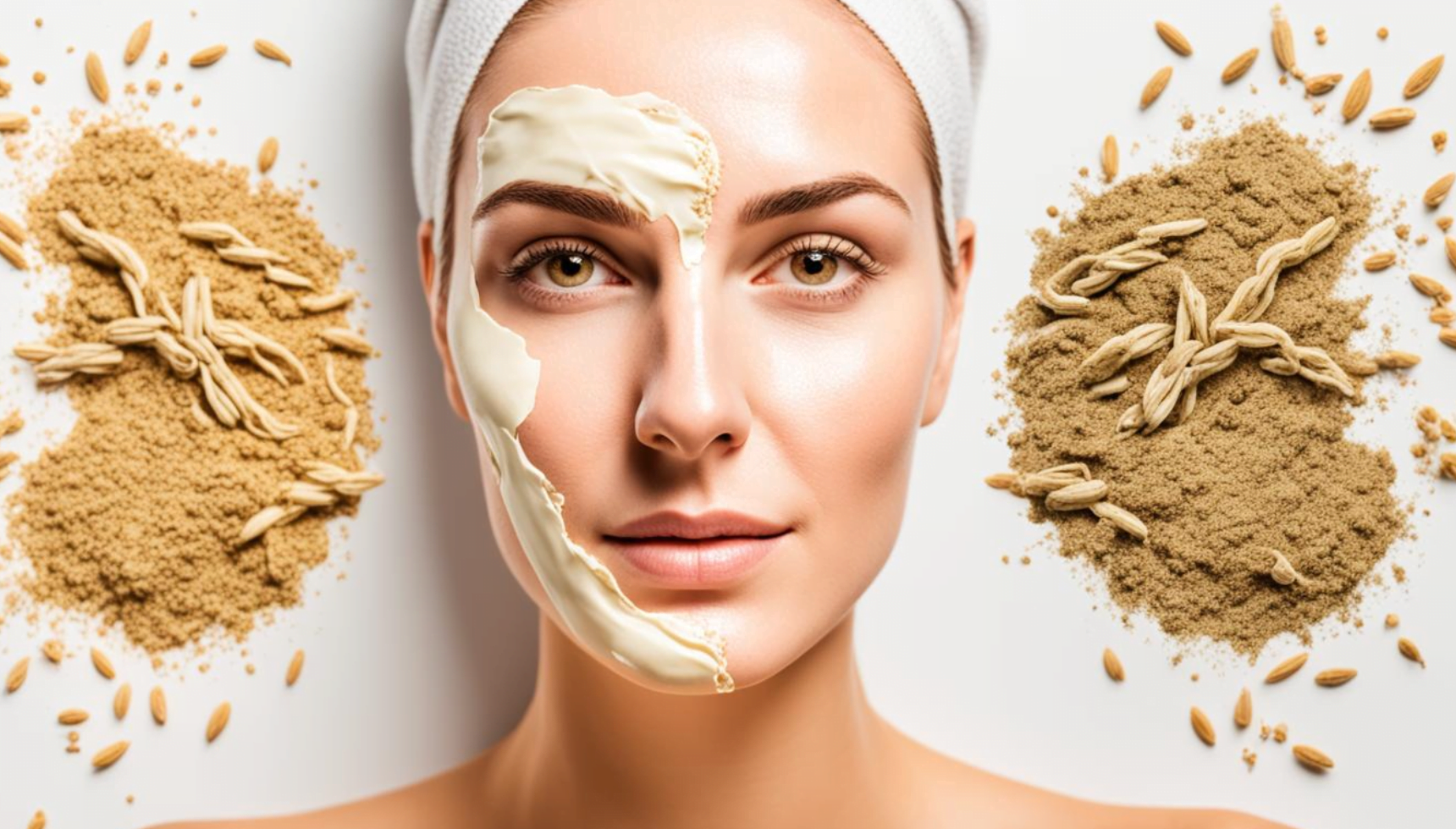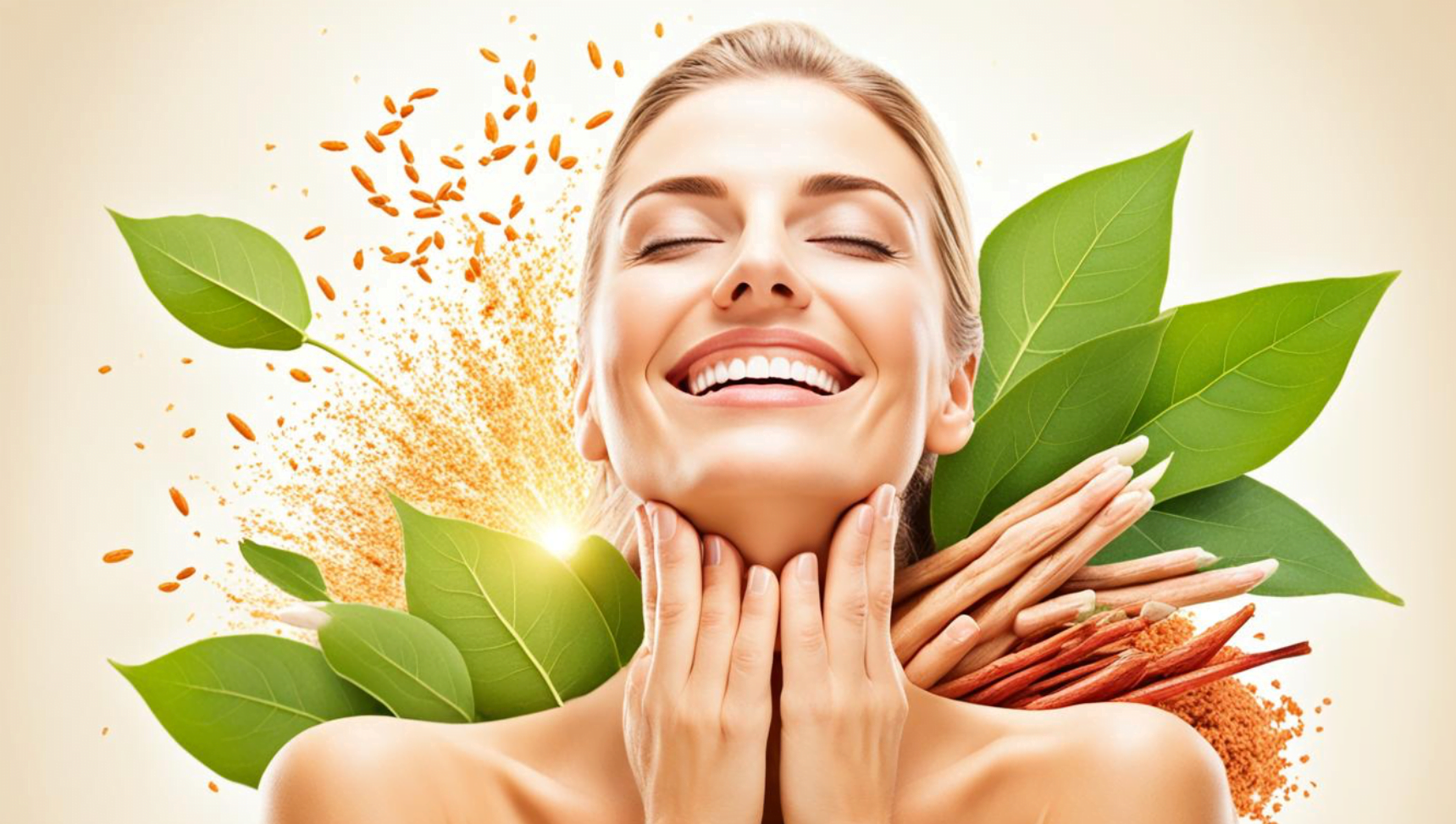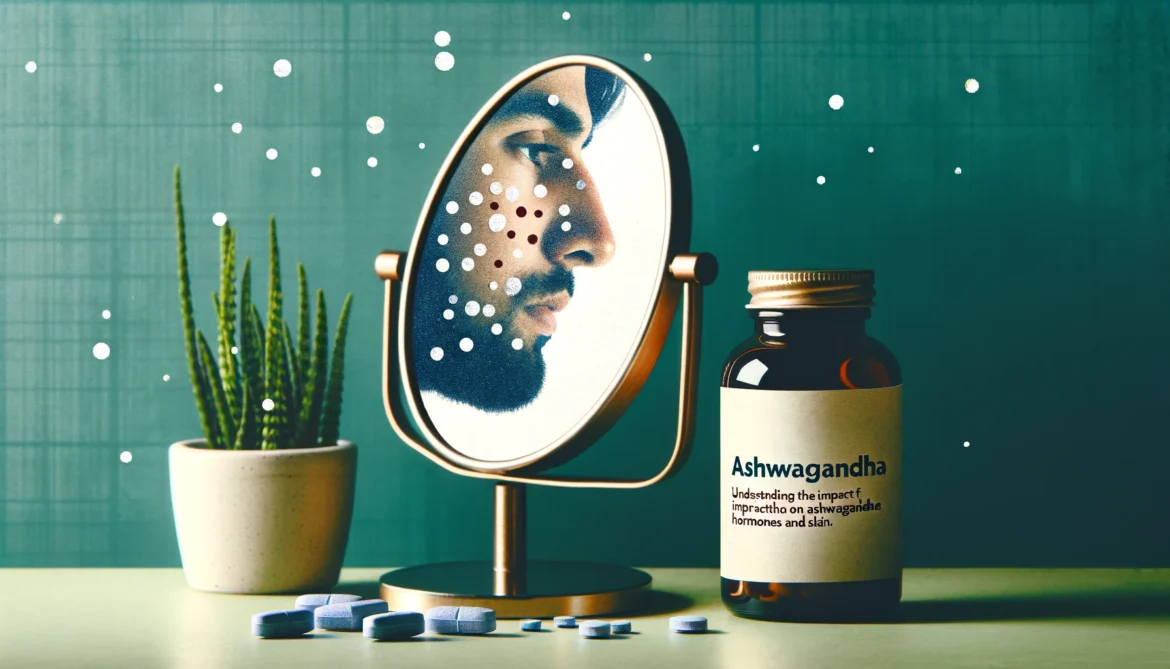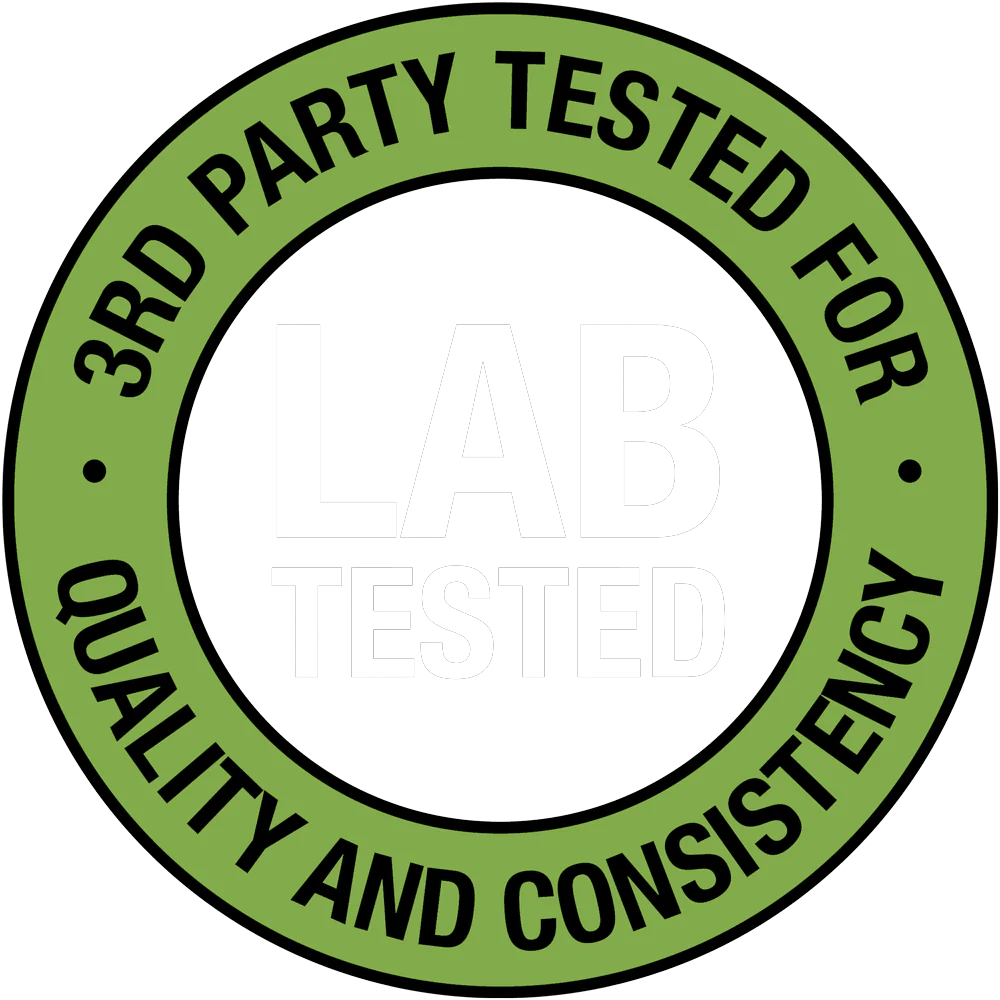Ashwagandha is a powerful herb in Ayurvedic medicine. It’s known to boost testosterone levels. This makes us wonder, can ashwagandha cause acne? Though it’s great for fighting stress, we should look at how it might affect our skin, especially with hormonal acne.

The herb comes from the Withania somnifera plant. It’s used to reduce stress, boost physical performance, and balance hormones. Acting as an adaptogen, it helps our body deal with stress better. It might lower cortisol and improve our sleep. But, here’s the thing: it can raise testosterone levels, which could impact acne. More testosterone might mean more oil production, which could block pores and cause more acne.
Though we don’t have direct proof that ashwagandha causes acne, its effects on hormones and skin can’t be ignored. If you’re thinking of using ashwagandha in your skincare or health routine, especially if you get acne, talk to a doctor. This step will help you understand how ashwagandha might affect your skin health. Then, you can decide what is best for you.
What is Ashwagandha? A Brief Overview
Ashwagandha, also called Withania somnifera, is an important herb in Ayurvedic medicine. This ancient herb from India is used for many health benefits. It helps reduce stress and improve how well you perform physically.
Origins and Traditional Uses
Ashwagandha comes from the Withania somnifera plant. It has been used in Ayurvedic medicine for a long time. It’s known to help the body feel young, boost energy, and help you live longer.
It’s traditional uses include stress management, pain relief, diabetes treatment, and increasing stamina. These benefits come from its nature as an adaptogenic herb.
Modern Applications in Alternative Medicine
Today, ashwagandha is still very popular in alternative medicine. Studies show it can lower stress and anxiety by reducing cortisol. It also has benefits for reducing body inflammation.
Ashwagandha is also praised for its role in enhancing sports performance. It can make you stronger, increase muscle size, and improve fitness. Some research indicates it might help with diabetes and blood sugar iffering anti-diabetic effects.
| Benefit | Application | Supported By |
|---|---|---|
| Stress Reduction | Helps manage anxiety and reduce cortisol levels | Studies on stress and anxiety levels |
| Physical Performance | Enhances strength, muscle size, and cardiorespiratory fitness | Athletic performance research |
| Anti-Inflammatory | Reduces inflammation and boosts antioxidant effects | Properties in clinical studies |
| Blood Sugar Regulation | Potential anti-diabetic effects | Research on blood sugar levels |
| Testosterone Levels | May increase testosterone, impacting physical performance and sperm health | Studies related to hormone levels |
Can Ashwagandha Cause Acne?
We’re looking at whether ashwagandha can cause acne. It’s known as an adaptogen. This means it can affect our hormone levels, including testosterone. These changes might link to the development of acne.
Theories Behind Ashwagandha-Induced Acne
Some theories point to a link between ashwagandha and acne. They think it might increase testosterone levels. This could make the skin produce more sebum. Sebum is an oily substance that can clog pores and lead to acne.
Hormonal Effects and Acne Correlation
There’s research showing that ashwagandha can help manage stress. It does this by possibly balancing cortisol, a stress hormone. But, it might also change androgen levels in a way that causes hormonal imbalances. Such imbalances are often connected to acne development.
Testosterone and Sebum Production
Studies say that high testosterone may lead to more sebum. This increase in sebum can clog pores, contributing to acne. Ashwagandha has benefits such as reducing stress and improving muscle function. But, these improvements come with a possible downside for those prone to acne.
| Potential Effects of Ashwagandha | Positive Impact | Negative Impact |
|---|---|---|
| Hormonal Regulation | May balance cortisol levels, reducing stress | Possible increase in testosterone levels |
| Skin Health | Anti-inflammatory properties | Elevated sebum productionleading to acne |
| Physical Performance | Improves muscle strength and oxygen use | Potential hormonal imbalancesaffecting skin |
It’s critical to understand how ashwagandha interacts with our hormones. Some may worry about its acne risk. But, for many, its health advantages could be more important.
Benefits of Ashwagandha for Skin Health
Ashwagandha is an herb that is used for many skin benefits. Concerns exist about it causing acne, but its pros are more prominent. It’s great at fighting inflammation and cutting stress. This makes it super useful for improving your skin situation, including keeping acne at bay.

Anti-inflammatory Properties
Loaded with helpful phytochemicals, ashwagandha fights inflammation like a pro. Its components are known to calm skin swelling. This keeps our skin healthy and vibrant.
Besides, ashwagandha is good at slowing aging signs too. It does this by upping collagen, leading to smooth, tight skin. As a result, wrinkles find it tough to stick around.
Stress Reduction and Hormonal Balance
Ashwagandha is awesome at cutting stress, a big plus for our skin. It lowers cortisol, a major stress hormone. This helps keep our hormones in check, improving our skin by lessening stress-related problems. For people prone to acne, this can mean fewer surprise breakouts.
It’s also handy in controlling oily skin and dark patches. After just 14 days, it can make skin look more even. This is because it helps control the production of melanin, which fights dark spots.
While using ashwagandha, a bit of caution is wise. Yet, don’t miss out on all the ways it can boost your skin health. By using its power against inflammation and stress, we can make our skincare even better.
| Benefit | Mechanism | Outcome |
|---|---|---|
| Anti-inflammatory properties | Rich in phytochemicals like withanolides and alkaloids | Lower skin inflammation |
| Stress relief | Reduces cortisol levels, promoting hormonal balance | Fewer stress-related breakouts |
| Increased collagen production | Antioxidant properties stimulate collagen formation | Smoother, firmer skin |
| Improved skin hydration | Boosts hyaluronan formation | Softer, smoother skin |
| Anti-aging effects | Reduces wrinkles, prevents telomerase loss | Enhanced skin firmness and regeneration |
Potential Side Effects and Risks of Ashwagandha
Ashwagandha offers many health benefits but comes with some side effects. It affects hormone levels, notably increasing testosterone. This might cause more oily skin and block skin pores, leading to acne. People who usually have hormonal acne should be careful.
There are other health concerns with ashwagandha too. Some might feel upset stomach or drowsy. An allergic reaction is possible as well. Catching these signs early on can avoid more severe problems. For example, feeling nauseous may happen when you start taking a new supplement.
It changes hormone levels, which can affect other functions in the body. This could make acne worse in those already experiencing it, especially under stress. Although known for helping with stress, keeping an eye on how ashwagandha influences your body is vital to keep your hormones balanced.
Ashwagandha can also impact our health in positive ways. It may help with diabetes by lowering blood sugar. Studies suggest it could benefit heart health by reducing cholesterol and triglycerides. But remember, its side effects mean we should be cautious. Always start with a small dose and increase it slowly while being guided by a professional. This approach can reduce possible risks.
| Possible Risk | Implication |
|---|---|
| Increased Testosterone | Can lead to acne breakouts |
| Digestive Upset | Symptoms like nausea and stomach pain |
| Allergic Reaction | Potential for skin rashes or hives |
| Impact on Hormone Levels | Potential to worsen hormonal acne |
In sum, while ashwagandha has many pluses, we should be conscious of its potential side effects. Speaking with healthcare experts can help us address health worries safely. This way, we can enjoy the herb’s benefits while avoiding harmful reactions.
Using Ashwagandha Safely: Recommendations
Ashwagandha provides many health benefits, but using it safely is important. It’s key to stick with certain rules. This helps make sure you get the good effects without any harm. We’ll cover what dose to take, other options, and why talking to your doctor is crucial.
Dosage and Administration Tips
How much ashwagandha to take depends on your health target and state. Start with a low dose, then increase slowly. Here are some guidelines:
- For stress relief: 250-600 mg per day
- To improve physical performance: 500-1,000 mg per day
- For anti-inflammatory benefits: 250-500 mg per day
Follow the instructions on the supplement’s label closely. This helps you gain the most benefits with little risk of side effects.
Alternatives to Ashwagandha for Skin Health
If using ashwagandha is risky for you, especially if you’re prone to acne, other choices exist. They also help skin health because of their anti-inflammatory and antioxidant traits:
- Turmeric: Its strong anti-inflammatory powers make it a good option.
- Chamomile: Known for its ability to calm and heal skin.
- Neem: Used in skincare for its bacteria-fighting and soothing abilities.
- Green Tea: It’s full of antioxidants that fight inflammation and keep skin well.
Consulting with Healthcare Providers
Always talk to your doctor before starting any new supplement, including ashwagandha. Your doctor can offer advice tailored to you. They’ll make sure it’s okay for your health condition and see if there are better options. This also helps prevent any bad interactions with other medicines.
| Supplement | Key Benefits | Potential Risks | Recommended for Skin? |
|---|---|---|---|
| Ashwagandha | Stress relief, anti-inflammatory, hormone balance | Increased testosterone, acne exacerbations | Yes, but with caution |
| Turmeric | Anti-inflammatory, antioxidant | Rare allergic reactions | Yes |
| Chamomile | Calming effects, reduces irritation | Possible allergies | Yes |
| Neem | Antibacterial, anti-inflammatory | Potential skin dryness | Yes |
| Green Tea | Rich in antioxidants, reduces inflammation | Minimal risks | Yes |
Conclusion
The benefits and risks of ashwagandha on the skin are complex. Its connection to acne is through effects on hormones. This is especially testosterone.
Higher testosterone might cause more oil and block pores, leading to acne. Also, it can tweak thyroid hormones, which can mess with acne indirectly.
Ashwagandha fights stress and inflammation, which is good news for the skin. Less stress can help with acne. It can also balance hormones, which may control hormonal acne.
This herb boosts well-being, which is key for skin health. To enjoy ashwagandha’s benefits safely, start with low doses. And always talk to your healthcare provider. If you’re not sure about ashwagandha, there are other options like turmeric and chamomile. These are also friendly to the skin.
Thinking about our personal health when choosing these herbs is essential. With the right approach, ashwagandha can boost our brain and body health. It can also keep our skin looking great.
FAQ
Q: Can Ashwagandha cause acne?
A: There’s no clear proof that ashwagandha directly causes acne. Yet, it might raise testosterone levels. This could make more oil in the skin. More oil can block pores, leading to acne.
Q: What is ashwagandha?
A: Ashwagandha comes from the Withania somnifera plant. It’s known for helping the body deal with stress. It can also boost physical performance and balance hormones.
Q: What are the origins of ashwagandha?
A: It’s originally from India and Southeast Asia. For thousands of years, it has been used in Indian medicine. It’s used to increase vitality, lifespan, and well-being.
Q: How is ashwagandha used in modern alternative medicine?
A: Nowadays, it’s seen as a way to lower anxiety and inflammation. It’s also good for sleep. It helps the body handle stress and is called an adaptogenic herb.
Q: What theories exist about ashwagandha-induced acne?
A: Some think it could cause acne by changing hormone levels, especially testosterone. This can lead to more skin oil. More oil means more clogged pores and acne.
Q: How do hormonal effects and acne correlate?
A: High androgen levels, like testosterone, can increase skin oil. This leads to clogged pores and acne.
Q: What is the relationship between testosterone and sebum production?
A: More testosterone can mean more skin oil. Too much oil can clog pores, causing acne.
Q: What are the benefits of ashwagandha for skin health?
A: Ashwagandha is good for the skin because it fights inflammation and stress. This can protect the skin, make it look younger, and keep it healthy.
Q: How can ashwagandha help with stress and hormonal balance?
A: It works by helping the body manage stress and balance hormones. This can make the skin healthier and reduce stress-related skin problems.
Q: What are the potential side effects of ashwagandha?
A: It might cause upset stomach, tiredness, or allergies. It can also affect hormones and possibly cause acne in some people.
Q: What should be considered when using ashwagandha?
A: Start with a small dose, then go up. Talk to a healthcare provider for the best advice. This keeps its use safe.
Q: Are there alternatives to ashwagandha for skin health?
A: Yes, things like turmeric, chamomile, neem, and green tea are good for the skin. They help fight off inflammation and damage.
Q: Why is it important to consult with healthcare providers before using ashwagandha?
A: Speaking with a healthcare provider is key. It ensures ashwagandha is safe, especially if you’re ill, taking meds, or have acne related to hormones.
Our commitment is to support health and wellness, and our guides aim to empower you with the knowledge to make informed decisions about your well-being.
We are proud to hold a 5-Star Hygiene Rating, a testament to our unwavering commitment to quality and safety. You can view our rating here.
Our products are non-GMO, not tested on animals, and are crafted by our HCCAP-certified food hygiene and manufacturing staff.
Our Scientific Studies Database and 3rd Party Tests sections provide additional insights and transparency about our products, while our Reviews section offers firsthand experiences from our valued customers.
We appreciate any feedback or inquiries related to our content as part of our mission to uphold accuracy and transparency

